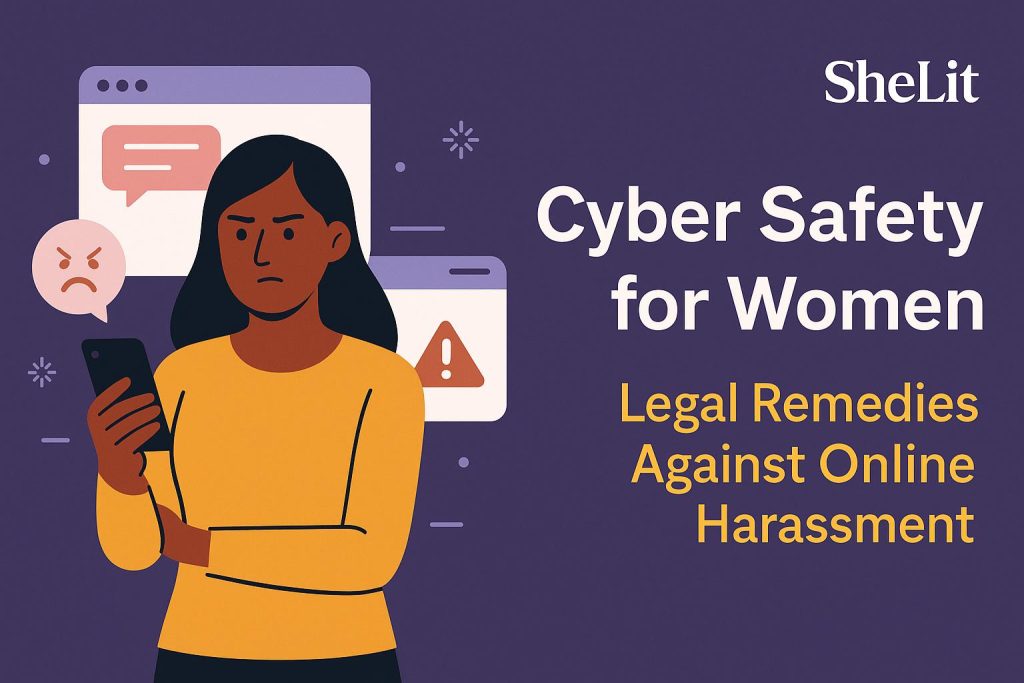In today’s digital world, the internet is an essential part of our lives — from social media to professional networking. However, for many women, it also brings an ugly side: online harassment.
Trolling, cyberstalking, hacking, threats, body shaming, and even blackmail have become common experiences.
At SheLit, we believe knowledge is the first step toward empowerment. Let’s understand what legal remedies are available for women facing online harassment in India.
What is Online Harassment?
Online harassment includes any unwanted, aggressive, or threatening behavior that takes place over the internet or digital platforms.
Examples include:
- Sending abusive or threatening messages
- Sharing private photos without consent
- Cyberstalking (constant monitoring, messaging, or intimidation)
- Hacking social media accounts or emails
- Impersonation (creating fake profiles)
- Doxxing (publishing private information like addresses)
Key Laws Protecting Women Against Online Harassment
Here are the main Indian laws you can rely on:
- Information Technology Act, 2000
- Section 66E: Punishment for violating privacy (sharing private images without consent)
- Section 67: Punishment for publishing obscene material online
- Section 66C: Punishment for identity theft and impersonation
- Section 66D: Punishment for cheating by personation using computers
Penalty: Up to 3 years in jail and/or fines.
- Indian Penal Code (IPC)
- Section 354D: Cyberstalking (following a woman’s online activities without consent)
- Section 509: Words or gestures intended to insult the modesty of a woman
- Section 499 & 500: Criminal defamation for harming a woman’s reputation online
- Section 507: Criminal intimidation through anonymous communication (threatening calls, emails)
Penalty: Varies from 1 year to 7 years depending on the severity.
- The Sexual Harassment of Women at Workplace Act, 2013
Even online sexual harassment by colleagues, bosses, or clients is punishable under this Act.
Step-by-Step Guide: What to Do If You Are Harassed Online
Step 1: Collect Evidence
- Take screenshots of chats, emails, posts, or comments.
- Save URLs, email headers, and any digital trail.
Step 2: Report to the Platform
- Block the offender immediately.
- Report abusive accounts or posts on Facebook, Instagram, Twitter, LinkedIn, etc.
Step 3: File a Complaint
You can report cybercrimes:
- At your nearest Cyber Cell police station
- Or online at India’s official cybercrime portal:
Note: In cases of severe threat (like rape or death threats), file an FIR immediately at your local police station.
Step 4: Approach Women’s Organizations
Several NGOs and legal organizations offer support, counseling, and even free legal aid.
Important Points to Remember
- You do NOT have to tolerate online abuse — every woman has the right to a safe digital space.
- You do not need a lawyer to file an initial complaint (but legal advice is helpful later if needed).
- Filing false complaints is punishable — always stay honest in your case.
- Cyber safety is your right — not a privilege.
⸻
Frequently Asked Questions (FAQs)
Q: Can I file an anonymous complaint?
A: Yes, while reporting on https://cybercrime.gov.in , you can choose to file anonymously, especially for reporting content like child pornography or rape threats.
Q: What if the offender is from another country?
A: You can still report the crime. Indian law enforcement can collaborate with international agencies through proper legal channels.
Q: Can a minor girl file a cybercrime complaint?
A: Yes. A minor’s guardian can file the complaint on her behalf.
Online spaces should be as safe as our real-world ones. If someone violates your digital freedom, you have the full right to fight back — legally and confidently.
At SheLit, we stand with every woman navigating her digital journey.
Stay strong, stay safe — and never stay silent.

